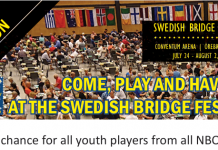- Patience. Bridge skills improve fairly slowly. While they are improving, you will make errors. To improve, you must be able to acknowledge the errors and live with them. If you won’t accept an error as an error, you wont learn not to make it again.
- Learning and playing occur separately. When playing, your goal is to do your best with the skills you have at the moment. There is a ton of stuff to think about and pay attention to. The last thing you need is someone explaining how you could have made the last hand on a squeeze. So don’t ask for lessons from your partner while you are playing. You need that mental energy just to use the skills you already have. Instead, do your learning after the session by reviewing the hands.When you have added that skill to your toolbox, apply it during a future session.
- Focus on process, not outcomes. Outcomes are your scores. Unfortunately, scores have a randomness factor. You can play a hand well and get a bad score. You can also play a hand poorly and get a good one. You can even play flawlessly for a whole session and get a mediocre score, or play mixed and get a great one. So outcome is a misleading indicator of the quality of your play. Process is the mental process you follow while choosing your bids and making your plays. If you focus on improving your process, you will be working on the part of bridge that you can control. Further, you can work on process even on hands where good process wont change the outcome. For example, you can practice counting declarer’s shape and tricks even though he is simply cashing out.
- Rehearse the basic skills. Skilled musicians spend countless hours rehearsing to gain facility on their instruments. You will need to rehearse as well. For example, With my students, I deal random hands, let them play versus robots, and I ask questions like “how are the clubs divided?” “How are the high cards divided?” asking yourself these types of questions on every hand is the equivalent of the musician mastering fingering on his stringed instrument. It is an underlying fundamental skill. It doesn’t make you a great player by itself, but without mastering it, being good at the instrument simply isn’t possible. Same with counting. Bridge skill starts with gathering information—observing the defender showed out on the second round of clubs. Then moves on to counting to establish in your mind all the information that is known, then moves onto to drawing inference now that I know clubs were 6–4–2–1 around the table what can I infer about other suits?, and finally moves onto making a plan for how to take a certain number of tricks.
Corey Cole, Ruby Life Master at bridge, still and always learningThe most important tool for improving your bridge game is to practice counting everything – distribution, high card points, etc.
By the way, “count” doesn’t mean 1, 2, 3, 4. It is more about recognizing patterns and doing simple arithmetic. For example, let’s say you are declarer and have five hearts in your hand and four in the dummy. That’s nine, and there are 13 hearts in the deck, so the opponents have four. They can be 0–4, 1–3, 2–2, 3–1, or 4–0. After you play a round, and let’s say both follow, then the remaining two hearts are either 0–2, 1–1, or 2–0.
Once you get accustomed to counting everything all the time, you can start making inferences. If an opponent opened the bidding, they probably have at least 11 high card points. If their partner responded, they probably have at least five. Listen to the auction and watch all of the plays. Did an opponent lead a King? Then they probably have the Ace or Queen of that suit, and that accounts for 9 or 5 high card points.
Count, count, count. Constantly adjust your counts based on new knowledge from the bidding and play. Practically every other bridge skill is dependent on accurate counting.
Editor’s Note: All about counting: Click Here
Carl Gentile, I’ve been playing bridge for 40 years. Still learningFind a regular partner and play. And then play some more. Having a regular partner will allow you to develop a rhythm and a style. Keep your systems and agreements simple. Once you start having some success, start adding a few conventions. Unless you are playing at the top levels, less is more in the way of conventions.
It would be best to find someone at your level or a little better. More importantly, find someone who is positive and upbeat. Someone who will support you as you start to get better. Stay away from those that criticize and demean. If you find yourself not having fun, find another partner. By the way, treat your partner with respect as well. It’s OK to talk about a mistake, or suggest an alternate hand play, but do it with love and a desire to learn, not with the intent to make your partner feel bad.
When I first started to play , there was a guy who an excellent player, but a horrible partner. He would constantly criticize his partner and even the opponents. I had the honor of playing as his partner, exactly once. He knew I was a beginner, but halfway through the evening he said “It’s like three against one”. I then understood why he seemed to play with a different partner every week.
Good luck. Bridge is a game you can play your whole life and never master. It’s a little like golf without the slice.
Helene Hoegsbro Thygesen, Bridge enthuisiast, 5th top contributor to Bridge Base ForumOne underrated factor is physical fitness. Get enough exercise before the game and enough water during the game. Good nutrition should aim at keeping your blood sugar stable.
Avoid alcohol, even if you are one of those who think they can still think clearly after one or two drinks. You just can’t. But maybe alcohol prevents you from noticing your mistakes.
Provide psychological support for partner. Give compliments when appropriate. Never give unsolicited critique, especially not during the session.
Identify your weaknesses and try to find out which of them you can improve on. Counting is a key skill to improve for many bridge players.
When discussing bridge with partner, put the emphasis on agreements. Unless you are both very strong in bidding and signalling theory, don’t try to reinvent the wheel but rather select a good textbook and agree to follow it. You can then discuss interpretations of the text and you can maybe consider omitting some of the conventions.
When discussing bidding and card play with partner, use hypothetical hands as examples. Using hands you actually played will bias you towards what happened to work on that hand.
If you want to take your agreements a step further after you have gotten the basic bidding system straight, put emphasis on carding, leads, overcall style and preempt style. I deliberately did not include “add more bidding conventions” to the list. Conventions are overrated.
Read books by Hugh Kelsey, Dorothy Truscott and Larry Cohen. Bergen’s “Points Schmoints” are also good.
Alan Bustany, Trinity Wrangler, Congress DirectorThe best way for you depends a lot on you and your current ability, but for the average Club player one of the better ways to improve your results is to concentrate more on defence.
Too many people play automatically in defence. They follow suit with the lowest card, discard the lowest card, and don’t think about the timing of winning tricks. You should learn about and use signals for attitude, count, and suit preference and make sure your opponents rarely if ever get an extra trick.
You play only about 25% of hands as Declarer. You play twice as many hands as a Defender. Defence makes twice as much difference as your ability to make your own contracts.
Aleksis Zalitis, Junior international.You can improve your bridge game by doing the following things (Note, that doing these is helpful if you want to improve in other areas besides bridge):- Practice This can be either by playing hands with a partner you like to play with, doing bidding practice or bidding tests, to improve your judgment, as well as solving defense and play problems. An important thing to keep in mind is that when playing you should always be counting.
- Discuss Bridge with other people, preferably those, who are better than you. For example, I had not too far in the past this hand: 9;KJ9xx;9;AJ9xxx(x=irrelevant small card) The auction goes 1 spade by partner, opponent overcalls 2 diamonds – what do you do now? You have not played much with your current partner. A key to consider is what to do when partner bids 2 spades over your bid.
- Communicate with your partner, never yell at him/her! By this I mean the following: Bridge is a game of mistakes, sometimes you, sometimes your partner will make mistakes, and you should know how to handle them. You should always try to find what is the reason why the mistake was made – there are cases when this happens due to missignaling, not understanding a signal correctly, or making confusing bids during the auction. What you should do is try to and minimize the amount of mistakes that happen due to misunderstanding. There is a good saying about this as well: It is better to have a bad agreement, then no agreement. Also, during the session, once you make a mistake, forget about the board and play the next one.
- Consume bridge content. There are a few online bridge forums in which you can participate and read what other people have to say about the game, this goes back to point 2. Reading books and blogs about bridge is also good. Some sites you can check out: Bridge Winners The Beer Card Justin Lall On youtube: Peter Hollands tgwnn
- System is less important than you might think.
If you are a system fanatic, then I can tell you that in the grand scheme of things it matters way less than you think. Playing with only basic agreements you will reach the right spot I’d say at least 80% of the time, if you have good judgement.
Dave Cunningham, had to play at age 8, rejoined ACBL to play Swiss Teams with a friend – did wellFrom the standpoint of learning various conventions, almost any text about Bridge will do you nicely.
Once you are familiar with “how to bid” you enter the wonderful area where the best teacher is experience. Which means, of course, that to improve your play, you must play as much as you can.
Back up north, I knew a person named Tannah Hirsch, Bridge who wrote the “Goren” bridge columns for many years.
The key to improving play is to make horrible mistakes, according to him. It is only by seeing where things can go wrong that one learns what amount of risk to take in bidding and playing hands.
I am not an expert – I only hold a bit over 25 Gold Points with the ACBL. I have a few more mistakes to go (I started playing over 60 years ago, and only recently joined the ACBL).
Don’t forget to follow us @



























